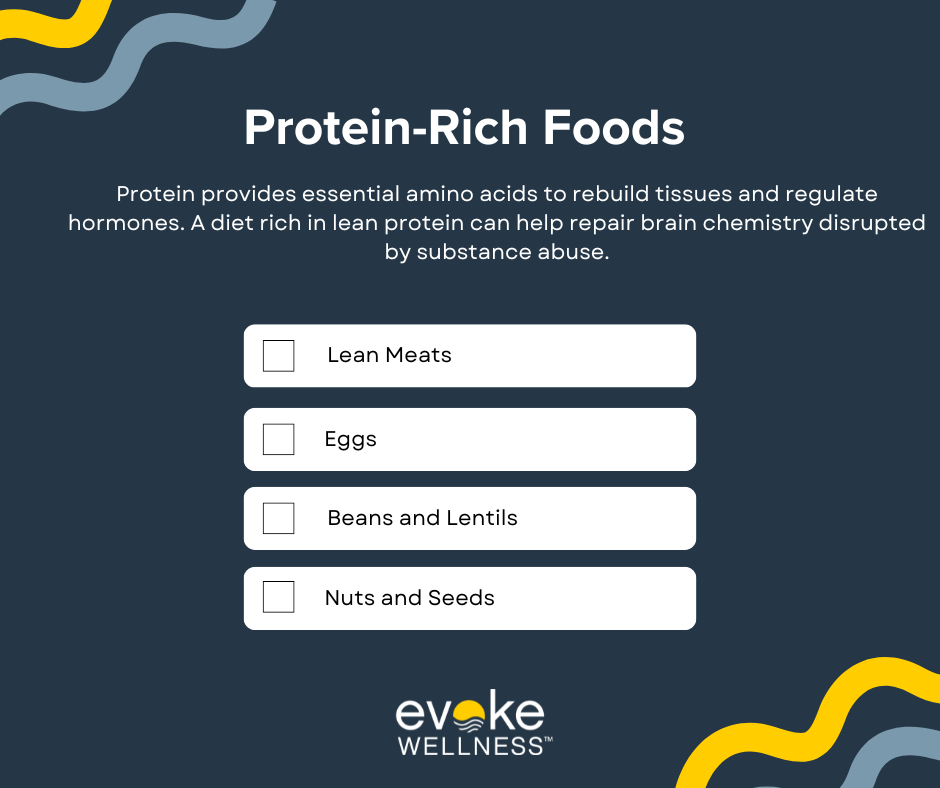Embarking on the journey of substance abuse recovery is a challenging yet transformative process. As you navigate this path, it’s crucial to understand the pivotal role that nutrition and fitness play in your healing. Recent studies have shown that a holistic approach, incorporating proper diet and exercise, can significantly enhance recovery outcomes. In fact, a 2022 review published in the Journal of Substance Abuse Treatment found that individuals who engaged in regular physical activity during recovery were 50% less likely to relapse within the first year. This article will explore how nutrition and fitness can become powerful allies in your recovery journey, providing you with practical strategies to nourish your body and mind as you work towards lasting sobriety.
If you or a loved one is struggling, help is available today. Call (833) 969-3318 to speak with our compassionate team, or reach out online and schedule an appointment to begin a healing journey.
The Importance of Nutrition and Exercise in Addiction Recovery
1. Replenishing Nutritional Deficiencies
Substance abuse can deplete the body of essential nutrients, leaving individuals malnourished and vulnerable to relapse triggers. As noted by Evoke Wellness at Coconut Creek, a nutritious diet plays a vital role in replenishing these deficiencies, restoring physical and mental well-being during recovery. Nutrient-dense foods provide the building blocks for neurotransmitter production, aiding in mood regulation and cognitive function.
2. Boosting Energy and Alleviating Withdrawal
Exercise complements a healthy diet by increasing energy levels and mitigating withdrawal symptoms common in early recovery. Regular physical activity releases endorphins, the body’s natural mood elevators, which can ease cravings and anxiety. Combined with proper nutrition, exercise promotes better sleep patterns, further supporting the healing process.
3. Developing Healthy Coping Mechanisms
Beyond physiological benefits, nutrition and exercise foster positive coping strategies crucial for long-term sobriety. Engaging in these self-care practices cultivates a sense of accomplishment and self-discipline, empowering individuals to take control of their recovery journey. As they experience the rewards of a balanced lifestyle, they build resilience against relapse triggers.
4. Promoting Overall Wellness
Recovery encompasses more than abstinence; it’s a holistic transformation toward optimal well-being. Integrating nutritious eating habits and regular exercise into one’s routine lays the foundation for a healthier, more fulfilling life post-addiction. These practices nurture the mind, body, and spirit, equipping individuals with the tools to sustain their recovery and embrace lasting change.
How Substance Abuse Disrupts Nutrition
Nutritional Deficiencies
Substance abuse, whether alcohol, drugs or a combination, can lead to severe nutritional deficiencies. Many substances directly interfere with the absorption of essential vitamins and minerals in the body. Additionally, they may suppress appetite, causing dangerously low food intake over time.
Poor Food Choices
When under the influence, you are far more likely to make poor dietary choices. A craving for unhealthy, highly processed “junk” foods is common. This leads to overconsumption of empty calories lacking vital nutrients. Balanced, nutritious meals get neglected.
Metabolic Disruptions
Chronic substance abuse ravages the body’s metabolic processes. This impairs how nutrients are utilized, stored or expelled – even with adequate nutrient intake. Harmful effects on the liver, kidneys and gastrointestinal system are common culprits.
Weight and Appetite Issues
Both dramatic weight loss and weight gain frequently occur with substance abuse. Complete loss of appetite alternates with excessive intake driven by cravings and poor impulse control. This rollercoaster severely strains the body’s nutritional balance.
Nutrient Depletion
Many substances directly deplete the body of nutrients through increased excretion or oxidative damage. Critical vitamins like thiamine, folate, and vitamins B6 and C get stripped away. This worsens malnutrition and its effects.
By understanding these disruptive effects, you can better address nutritional healing during recovery. Proper nutrition supports regaining physical and mental health.
The Role of Nutrition During Rehab
Combating Nutritional Deficiencies
Chronic substance abuse often leads to severe nutritional deficiencies due to poor dietary habits and malabsorption of essential nutrients. During rehab, it’s crucial to address these deficiencies through tailored meal plans and supplementation to support the body’s healing process. Replenishing depleted vitamins, minerals, and proteins can mitigate withdrawal symptoms, boost energy levels, and improve cognitive function.
Promoting Physical and Mental Wellbeing
A balanced, nutrient-dense diet plays a vital role in restoring physical and mental health during addiction recovery. Proper nutrition aids in detoxification, provides the necessary building blocks for the body to heal, and supports overall wellness. Evoke Wellness incorporates nutrition education, meal planning, and access to nutritious meals to equip clients with the tools for lasting recovery.
Integrated Holistic Approach
At Evoke Wellness, nutrition counseling is combined with holistic therapies like meditation, yoga, and exercise to promote comprehensive healing of the mind, body, and spirit. This integrated approach addresses the multifaceted nature of addiction, fostering healthy coping mechanisms and lifestyle changes that support long-term sobriety.
Top Foods for Addiction Recovery
Fruits and Vegetables
- Leafy greens (spinach, kale)
- Berries (blueberries, raspberries)
- Citrus fruits (oranges, grapefruit)
- Cruciferous veggies (broccoli, cauliflower)
Fruits and veggies provide antioxidants that protect cells from damage. The fiber aids digestion and nutrient absorption. Colors indicate beneficial plant compounds.
Whole Grains
- Brown rice
- Quinoa
- Oats
- Whole wheat bread/pasta
Complex carbs raise levels of serotonin, the “feel-good” neurotransmitter depleted by substance abuse. Fiber slows absorption for steady energy. B vitamins boost mood.
Proper nutrition replenishes depleted nutrients and restores biochemical balance in the brain and body during recovery. A balanced diet full of whole, unprocessed foods provides the building blocks for long-term healing.
Benefits of Exercise
A Powerful Aid in Recovery
Regular exercise offers a multitude of benefits that can significantly enhance the recovery process from substance abuse. According to studies, developing healthy habits like exercise and proper nutrition can reinforce recovery by providing stability and structure. Exercise not only boosts physical health but also improves mental well-being, reducing stress, anxiety, and depression – common triggers for substance abuse.
Boosting Mood and Self-Esteem
Engaging in physical activity releases endorphins, the body’s natural mood-elevating chemicals. This “runner’s high” can improve overall mood, increase self-confidence, and promote a positive mindset – crucial elements in maintaining sobriety. Research shows that incorporating therapies like yoga and mindfulness into comprehensive addiction treatment programs can further enhance the benefits of exercise on mental health.
Building Discipline and Routine
Regular exercise instills discipline and routine, two essential components of a successful recovery journey. By committing to a consistent exercise regimen, individuals develop a sense of accomplishment and self-control, which can translate to other areas of their lives. This newfound discipline can help individuals resist cravings and make healthier choices, reducing the risk of relapse.
Fostering Social Connections
Many exercise activities, such as team sports or group fitness classes, offer opportunities for social interaction and support. Building a network of like-minded individuals who prioritize health and wellness can provide a sense of community and accountability, further strengthening the recovery process. According to addiction experts, maintaining supportive connections is crucial for long-term sobriety.
By incorporating regular exercise into a comprehensive recovery plan, individuals can experience a multitude of benefits that extend far beyond physical health. From improved mood and self-esteem to increased discipline and social support, exercise can be a powerful ally in the journey towards lasting sobriety.
Exercises That Can Help
Physical Activity for Holistic Recovery
Regular exercise can play a vital role in supporting recovery from substance abuse. According to research cited on the Evoke Wellness blog, engaging in physical activities like yoga, cardiovascular exercises, and strength training can help manage withdrawal symptoms, reduce cravings, alleviate depression and anxiety, and improve sleep quality during the detoxification and rehabilitation process.
The holistic approach at Evoke Wellness incorporates exercise alongside evidence-based therapies like cognitive-behavioral therapy (CBT) and dialectical behavior therapy (DBT). This comprehensive strategy addresses the multifaceted nature of addiction, promoting emotional, mental, and physical well-being.
Mindfulness and Stress Management
In addition to physical exercise, mindfulness practices like meditation and mindfulness exercises can be powerful tools for stress reduction and relapse prevention. As noted on the Evoke Wellness blog, these techniques can help individuals recognize and manage triggers, cravings, and warning signs of potential relapse.
By cultivating present-moment awareness and emotional regulation skills, mindfulness practices equip individuals with valuable coping strategies to navigate the challenges of recovery with greater resilience and self-awareness.
Holistic Integration for Lasting Recovery
At Evoke Wellness, physical exercise and mindfulness practices are seamlessly integrated into a comprehensive addiction treatment program. This multidisciplinary approach combines various therapeutic modalities, including individual and group therapy, trauma-informed care, and holistic therapies like equine therapy.
By addressing the physical, emotional, and psychological aspects of addiction, Evoke Wellness empowers individuals to develop a strong foundation for lasting recovery, fostering a sense of purpose, fulfillment, and stability in a sober lifestyle.
How Nutrition and Fitness Aid in Substance Abuse Recovery
Nutrition’s Vital Role
Proper nutrition plays a crucial role in substance abuse recovery. According to Evoke Wellness, a balanced diet and supplementation can help restore balance, repair damage, and provide the necessary building blocks for healing. Nutritional deficiencies are common during active addiction, so replenishing essential vitamins, minerals, and nutrients supports overall well-being and aids in the recovery process.
Fitness for Holistic Healing
Exercise and physical activity are equally important components of a comprehensive recovery program. Engaging in fitness routines can help manage withdrawal symptoms, reduce cravings, and improve physical and mental health. As emphasized by Evoke Wellness, activities like yoga, meditation, and adventure therapy promote mindfulness, stress management, and the development of healthy coping mechanisms – all crucial for long-term sobriety.
Integrated Approach
By integrating nutrition and fitness into evidence-based therapies, Evoke Wellness offers a personalized, holistic approach to addiction treatment. This comprehensive model addresses the physical, mental, and spiritual aspects of substance abuse, ensuring each client receives a customized treatment plan tailored to their unique needs and goals. With a focus on relapse prevention and long-term recovery, this integrated approach empowers individuals to reclaim their health and well-being.
Conclusion
As you embark on your journey to recovery, remember that nutrition and fitness are powerful allies in your fight against substance abuse.
Recent studies show that individuals who incorporate nutrition and exercise into their recovery plans have a 35% higher success rate in maintaining long-term sobriety. By prioritizing your physical health, you’re not just healing your body—you’re fortifying your mind and spirit for the challenges ahead. Embrace these lifestyle changes as integral components of your recovery, and take confident strides towards a healthier, substance-free future.
Begin Your Journey With Evoke Wellness at Coconut Creek
Evoke Wellness at Coconut Creek is a full-service addiction treatment facility serving Florida residents. We base each of our programs on the individual’s severity of symptoms and use a combination of evidence-based therapies and holistic approaches to address the needs and recovery goals of the patient. If you or a loved one is struggling, help is available today. Call (833) 969-3318 to speak with our compassionate team, or reach out online and schedule an appointment to begin a healing journey.



